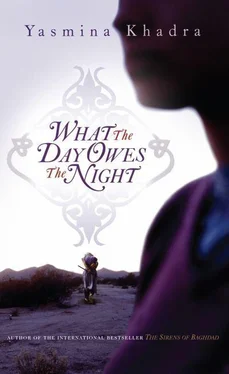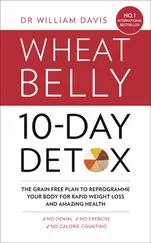What the day owes the nigth
Translated from the French by Frank Wynne
In Oran, as elsewhere, for lack of time and thinking, people are forced to love each other without realising it.
Albert Camus, The Plague
I love Algeria, because I have truly been affected by it.
Gabriel Garcia Marquez
MY FATHER was happy.
It had never occurred to me that he was capable of such an emotion.
Sometimes, the sight of his serene face disturbed me.
Hunkered on a pile of loose stones, knees clasped to his chin, he watched the breeze caress the slender stalks of wheat, breathe over them, scurry feverishly through them. The wheat fields billowed over the plains like the manes of thousands of horses galloping. It was like watching the sea as it rises and falls. And my father was smiling. I could not remember ever seeing him smile; it was not in his nature to show happiness – if he could be said to have ever felt such a thing. Moulded by adversity, his eyes usually bore a permanent look of desperation. His life had been an endless series of disappointments; he mistrusted the future, realising it to be traitorous and unknowable.
I had never known him to have friends.
We lived in isolation like ghosts on our patch of land, in the sidereal silence of those who have little to say to one another: my mother in the shadow of our shack, bent over her cooking pot, stirring a broth of root vegetables of questionable flavour; Zahra, my sister, three years my junior, crouched forgotten in some dark corner, so self-effacing that at times we did not even notice her; and me, a sickly, solitary boy, who had barely blossomed before I wilted, carrying my ten years like a burden.
This was not life; we merely existed.
The simple fact of waking in the morning was a miracle, and at night, as we readied ourselves for bed, we wondered whether it might not be better to close our eyes once and for all, convinced that we had seen all there was to see in life and that life itself did not warrant further examination. The days were desolate in their sameness; not a single one brought with it anything new, and each day died taking with it the few remaining illusions that dangled before us like the carrots used to urge on a donkey.
In the 1930s, poverty and disease swept the country, wiping out families and livestock with astonishing perversity, forcing those who survived into exile or vagrancy. We no longer received any news of those few relatives we had left. As for the ragged creatures we sometimes saw in the distance, we knew that they were merely passing through. The dirt track that led past our shack was gradually disappearing.
My father cared little.
He liked to be alone, hunched over his plough, lips flecked white with foam. Sometimes I saw in him some god, fashioning the world and would sit for hours watching him, fascinated by his strength, his determination.
When my mother asked me to take his meals out to him, I had to be prompt. My father ate punctually, frugally, eager to get back to work. I would have liked him to say a kind word, take some interest in me for a moment, but he had eyes only for his land. Only here, in the midst of this tawny universe, was he truly in his element. Nothing and no one, not even those dearest to him, could distract him from it.
In the evening, when we came back to our shack, the spark in his eyes would fade with the setting sun. He would become someone else, someone ordinary, someone dreary and uninteresting; I almost felt disappointed in him.
But for some weeks now, he had been unaccountably happy. The coming harvest promised to be glorious, exceeding his wildest expectations. Crippled with debts, he had mortgaged the lands that had belonged to his forefathers, and this harvest, he knew, was to be his last battle. He did the work of ten men, toiling relentlessly, a fire in his belly; a cloudless sky could terrify him, the smallest cloud electrify him. Never had I seen him pray and pour himself into his work as he did then. And when summer came, and the wheat scattered its glittering sequins across the plains, my father sat hunkered on a mound of loose stones, motionless. Hunched under his straw hat, he would spend most of the day staring at his crops, which, after years of thankless work, of lean cows, seemed finally to promise a sunny spell.
The harvest would come soon, and as the day drew closer my father became more excited. He could already see himself, arms outstretched, gathering in sheaves, trussing hundreds of bales, harvesting hopes so great he did not know what to do with them.
A week earlier, sitting me next to him on our little cart, we had gone to the village some miles beyond the hill. Usually he did not take me anywhere with him. Perhaps he thought that now that things were looking up, it was time to change, to learn new habits, new ways of thinking. On the way, he hummed a Bedouin tune. It was the first time in my life I had ever heard him sing. His voice dipped and soared, so out of tune it would scare the horses, but to me, no singer in the world could compare: it was glorious. Then he suddenly regained his composure, surprised to find he had been so carried away; embarrassed that he had shamed himself in front of his son.
The village was a depressing, godforsaken place, its cob walled huts cracking beneath the weight of misery, its narrow streets desperately twisting and turning, not knowing where to hide their squalor. A few skeletal trees, gnawed away by goats, stood withered and dying like gibbets. Crouched beneath the trees, the unemployed sat like ruined scarecrows waiting for a storm to come to carry them off.
My father stopped the cart in front of a squalid little shack surrounded by a group of barefoot boys with crudely patched tunics of jute sacking instead of gandurahs and shaven heads pocked with oozing sores that looked like some mark of damnation. They crowded round us, curious as a pack of fox cubs whose territory has been invaded. With a wave, my father sent them scurrying, then pushed me towards the grocer’s shop, where a man sat dozing amid the empty shelves. He did not bother to get to his feet to greet us.
‘I’m going to need men and tools for the harvest,’ my father said to him.
‘Is that all?’ said the grocer wearily. ‘I sell sugar and salt too, you know, oil, cornmeal.’
‘All that will come later. Can I depend on you?’
‘When do you want them, the men and the tools?’
‘Friday week?’
‘You’re the boss. You whistle, we’ll be there.’
‘Right, well let’s say Friday of next week.’
‘It’s a deal,’ groaned the grocer, pulling his turban down over his face. ‘Glad to hear you’ve saved the season.’
‘What I’ve saved is my soul,’ my father said as he turned to go.
‘To do that, my friend, you have to have a soul in the first place.’
Standing in the doorway, my father stopped and shuddered, detecting some slight in what the grocer had said. He scratched his head, climbed on to the cart and we headed home. The grocer had touched a raw nerve. My father’s face, so radiant when we first set out, was serious now. The grocer’s remark, he thought, was some dire omen. This was how my father was; at the slightest problem he immediately feared the worst. To boast about the harvest before it was gathered in was to tempt the evil eye. I knew he was bitterly regretting boasting of his success when not a grain had yet been harvested.
He drove home, his body coiled like a snake, flogging the mule with his whip, every lash bearing the mark of his fury.
As he waited for Friday, he dug out old billhooks and rusty sickles and set about cleaning and sharpening them. With my dog, I watched him from a distance, waiting for some word, some chance to make myself useful. But my father needed no help. He knew exactly what had to be done.
Читать дальше












